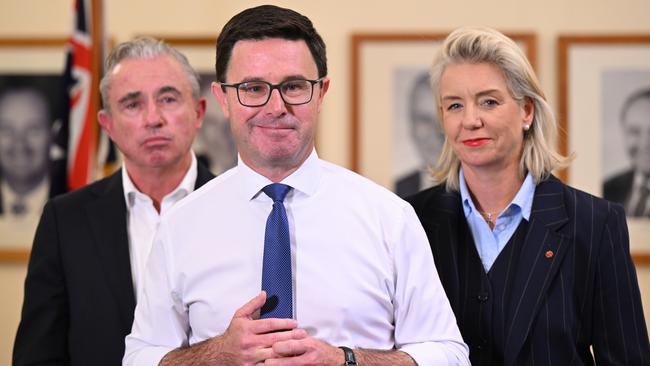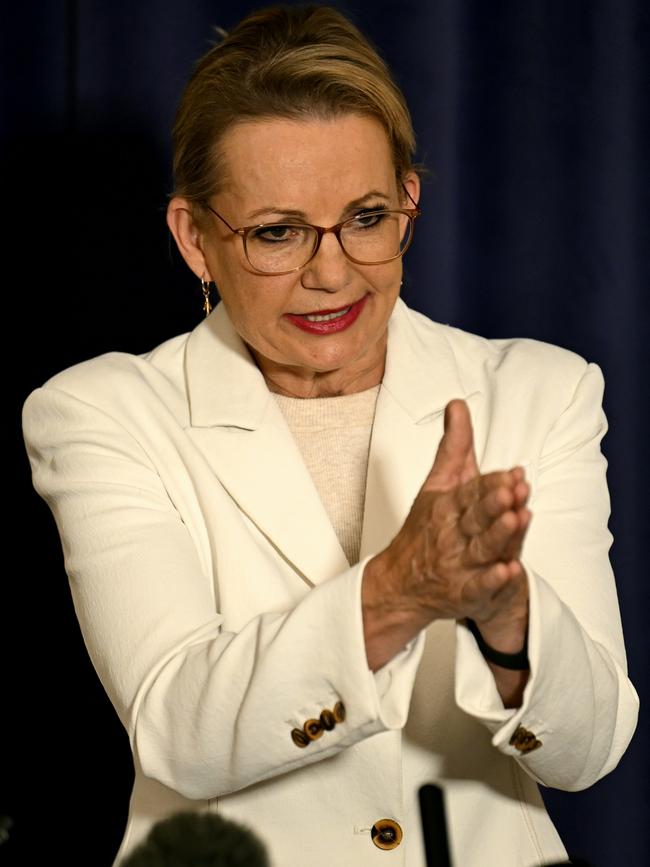Nationals to lose ‘staff, money’, deputy leader concedes
Deputy leader Kevin Hogan says the forgoing of personnel, finances, and ‘positions and titles’ was not a ‘focus of discussions’ of the party’s historic split with the Liberals.

The Nationals will lose “staff and money” after its abandonment of the Coalition agreement, deputy leader Kevin Hogan has conceded, but the forgoing of personnel, finances, and “positions and titles” was not a “focus of discussions” after of the party’s historic split with the Liberals on Tuesday.
Labor is likely to now have an easier time passing legislation through the Senate after the split and the Nationals would also have to prepare for the next federal election without the Liberals’ campaign machinery, which could be one of the things to “push” the pair towards an agreement before a 2028 poll.
It comes after Nationals leader David Littleproud gave his newly installed Liberal counterpart, Sussan Ley, only a half-hour warning before he announced the break-up of the federal Coalition for the first time in 38 years in a surprise Tuesday press conference.
Mr Littleproud on Tuesday said Labor was still his “enemy” and he would vote with the Liberals while Mr Hogan said the forfeiting of titles and opposition status was part of the decision’s parcel.
“This for us is a principled position (ending the agreement) … A lot of our members of our partyroom are going to lose positions and titles out of this, and money, and that wasn’t even a focus of the discussion for us,” the Nationals’ deputy leader said.
“We’ve all broken up in a relationship that’s been important to us, and very often, more often than not, you get back together and join back together with clearer clarity and focus on what the relationship was about.”
Mr Littleproud said if an agreement wasn’t reached before the next election, he believed there would be only a handful of “three-cornered contests” but refuted the move was a “dummy spit” as rather one made on “principle”.
“My commitment to (Ms Ley), as hers was to mine, was that hopefully before the next election, we can reaffirm a Coalition agreement,” he said.
University of Sydney political scientist Henry Maher said the implications of the split would affect payrolls and parliamentary practice. “It will mean likely fewer staff, as a result of not holding those (shadow) positions, and it means it will now be up to the Nationals to organise how they vote themselves and with their own party whip,” he said.

“But you would expect (the Nationals) will still vote mostly aligned with the Liberals, given the issues that they appear split on – nuclear power, supermarkets – are unlikely to come to parliament in this term.”
The split would appear to give the government another route to pass legislation in the Senate.
“With the Coalition no longer a voting bloc, it would give Labor the capacity to negotiate with one of the former partners to get something through,” Dr Maher said.
“There could be a pathway to get something through if, for example, the Greens aren’t on board, they could look to work with just the Nationals or just the Liberals.”
That the Coalition’s “machinery” would split to two behind the scenes would be most acutely felt before the next election, which would be “significant”.
“My expectation, and most people’s, is that (the parties) will rejoin before the next election,” Dr Maher said. “Were they to go to the election as separate parties, that would be very significant in terms of machinery and the Nationals won’t have access to that machinery to run as effectively.
“I think that is one of the things that will push them, as happened last time, to rejoin (in coalition) before an election.”
After Mr Littleproud’s announcement, the NSW Liberal and Nationals leaders reaffirmed the pair’s relationship and partnership before the early 2027 state election while the move would have “no bearing” on Queensland’s Liberal National Party.
The two parties in Queensland and the Northern Territory are formally joined and although in places like NSW and Victoria the two parties are in coalition, it’s unlikely Tuesday’s move will disrupt the partnerships, at least in the short and medium term, particularly given the factors driving division federally – like nuclear – had less bearing on state politics.






To join the conversation, please log in. Don't have an account? Register
Join the conversation, you are commenting as Logout